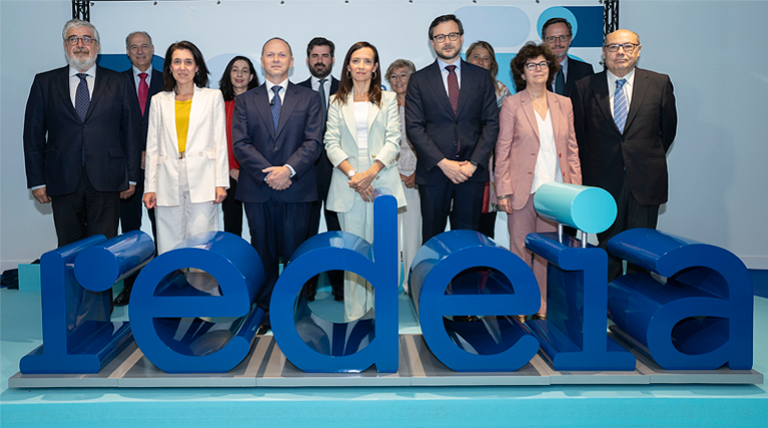We are a global operator of essential infrastructure
Responsible supply chain management
Our suppliers constitute a key stakeholder group for the Company and, therefore, we believe it is necessary to carry out a sustainable management of our supply chain, promoting responsible practices and applying sustainability criteria in all supply chain processes. All of this is reflected in our Sustainability Policy and as one of the priorities defined in our 2030 Sustainability Commitment. Said commitment has been designed taking into account that the priorities and actions of our company contribute significantly to the achievement of the Sustainable Development Goals.
The Group has a responsible supply chain management model that is managed based on the principles of non-discrimination, mutual recognition, proportionality, equal treatment and transparency, and follows the guiding principles laid down in a framework of legislative directives and internal Company codes, policies and regulations.
| Framework | ||||||
|---|---|---|---|---|---|---|
| Law 31/2007 | Code of Ethics and Professional Conduct | Supplier code of conduct | Procurement policy | Sustainability policy | Guide for the prevention of corruption | Internal regulation |
| Levers for ongoing improvement | ||||||
| Strategic plan of the Red Eléctrica Group | Transformation and resources master plan (Corporate Department) | Procurement master plan | Audits | Assesments | Customer and supplier satisfaction surveys | Objectives and projects |
| Pillars | ||||||
Continuous search for the lowest expected overall cost |
| |||||
Transparency and the separation of functions within the management processes |
| |||||
Ethical management and the development of suppliers and subcontractors |
| |||||
Minimisation of the risk associated with the procurement processes |
| |||||
Free and fair competition |
| |||||
| These Pillars are put into practice through processes and procedures, which are audited periodically, both internally and by independent auditors. These audits review, with different scopes, the processes, standards, certified management systems and risk control systems associated with the supply chain. Ten such audits were conducted in 2023, 11 in 2022 and a total of 14 in 2021. | ||||||
Extending sustainability principles throughout our supply chain
The Group extends its commitment to sustainability to all links in its value chain and has an explicit commitment to the responsible management of the supply chain, which includes the requirement that its suppliers take on the Group’s principles, priorities, strategy and goals in terms of sustainability. Furthermore, it seeks to convey the relevant and active role each supplier plays in the Group's commitment to sustainability as well as the importance of having everyone pulling in the same direction.
The Company voluntarily adheres to various initiatives and joins professional associations in order to bolster the Company’s commitment to sustainability and extend it to its to suppliers, noteworthy among these initiatives, is its pledge to the Ten Principles of the United Nations Global Compact.
As a company, we continue to focus on the areas of occupational health and safety, the natural environment, the fight against corruption and the respect for human rights. Additionally, the Company monitors the accident severity and frequency ratio of its contracted service & goods suppliers and has implemented measures to guarantee the health and safety of all the people who carry out their activity in our facilities.
Within the Company’s 2030 Sustainability Commitment, our Climate Change Plan contains a specific target related to the reduction of emissions associated with the supply chain (Scope 3) and the involvement of our suppliers in the commitments. As the first step, we have developed a methodology for measuring emissions associated with the supply chain and will continue driving the necessary actions to determine the maturity of our suppliers in their fulfilment of the reduction of emissions, in addition to setting new goals. Furthermore, we work closely with them to help them calculate and verify their carbon footprint.
The Group will also continue working on all the initiatives included in the 2030 Circular Economy Roadmap which establishes and prioritises, in alignment with the agents in the value chain, measures to reduce the consumption of raw materials in the production processes as well as to promote the use of recycled, renewable and biodegradable materials. Moreover, it seeks to put in place initiatives to maximise use of the goods at the end of their useful life. In order to foster and promote the circular economy throughout the value chain, the Company has identified, and included in said Roadmap, the circular economy criteria related to the supply chain that it considers of greater relevance. If you would like to learn more about such criteria, click here.
In order to transfer the Company's sustainability principles to the value chain, it has been established that the Supplier Code of Conduct be an intrinsic part of the contractual documentation. Compliance thereto is verified by conducting social audits on our suppliers.
Our suppliers’ feedback about us
In 2022, we received assessments from over 150 nationwide providers that provide supplies for Redeia’s transmission grid. The final result was as follows:
- Overall satisfaction rating: 7.4 points out of 10.
- Rating for the services through which the supplier interacts with our company: 7.8 points out of 10.
- Redeia's corporate reputation: 8.5 points out of 10.
In the overall assessment, suppliers highlighted the smooth communication and positive interaction and collaboration with Redeia. Secondly, they stressed our team’s professionalism, experience and image and identified opportunities for improvement, with requirements primarily related to planning and scheduling, as well as efficiency and agility in key processes.
Thank you all! Your collaboration allows us to improve every day.
(Documents available only in Spanish)














